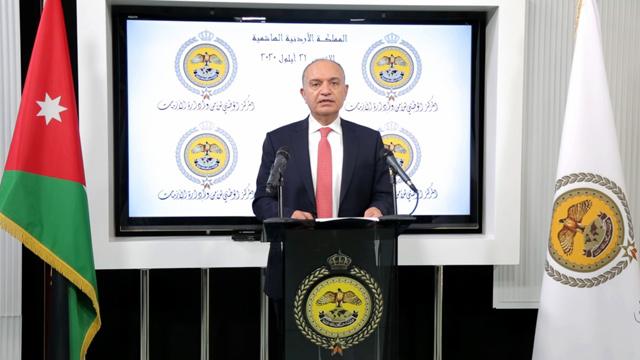- International News
- Tue-2020-09-22 | 03:15 pm

Nayrouz News Agency :
Two COVID-19 deaths and 266 virus cases including 264 local infections, were registered in the Kingdom on Monday, according to Health Minister Saad Jaber.
The local cases included 166 in Amman, 25 in Karak, 38 in Balqa, 8 in Irbid, 10 in Zarqa, three in Maan, one in Ajloun, three in Madaba and 10 in Jerash, he said.
Speaking during a joint press briefing with Minister of State for Media Affairs Amjad Adaileh and Official Spokesperson for the National Anti-Pandemic Committee Nathir Obaidat, at the National Centre for Security and Crisis Management, Jaber said that a total of 12,867 random virus tests were conducted on Monday, bringing the cumulative number of coronavirus tests administered since the beginning of the crisis to 1,830,488.
A total of 683 recovered patients left hospitals on Monday, he added.
Adaileh, the government's spokesperson, announced that security patrols will no longer be stationed to guard residential buildings under isolation.
The contacts of COVID-19 patients will be required to stay at their places until tested, the minister said, adding that they will be tracked by a mechanism decided by the relevant authorities.
A tracking mechanism for COVID-19 positive persons subjected to home quarantine and their contacts through the competent agencies was set, he noted.
The provisions of Defence Order No. 8 of 2020, which addresses protecting public health and limiting the spread of the coronavirus, will be applied against all violators that put public health at risk or cause the transmission of infection, the minister said.
Adaileh reminded the public that violators of Defence Order No. 8 face imprisonment terms of up to three years or a fine of JD3,000 or both.
Obaidat said that the National Anti-Pandemic Committee on Monday recommended approving the instructions and measures related to home quarantine, which include the health of the quarantined COVID-19 patients, their families and the public.
The new instructions included identifying the categories of patients who can undergo home quarantine as well as specifying a tracking mechanism for patients undergoing quarantine in their homes.
The committee also highlighted the need for developing a mechanism to transfer patients from home to hospitals when the need arises.
He added that the committee's recommendations also touched on the conditions of home quarantine, including the suitability of the quarantine place.
The committee's recommendations also highlighted the importance of obtaining a written consent from the family of the infected individual, as well as set the instructions of home quarantine and the procedures that maintain the health of the patients and their families.
The committee also recommended home quarantine for the mother if one of her children was infected.













